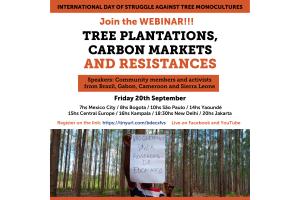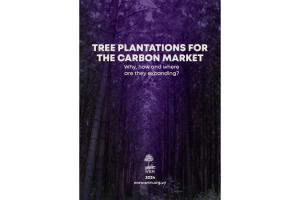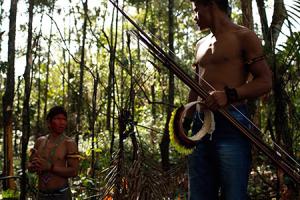Struggles Against Tree Monocultures
Corporate profit drives land grabs to install industrial tree monocultures. Where industrial plantations take root, communities' territories and lives are violently invaded, their forests destroyed and their water polluted. When communities resist, companies tend to respond with aggression. Despite this extreme violence, communities around the world are resisting, organizing and joining forces to defend their territories. Every September 21 the International Day of Struggle against Monoculture Tree Plantations is celebrated.
Publications
23 September 2025
The corporate lies behind the ever-increasing expansion of industrial tree plantations.
Articles
19 September 2025
This 21 September, International Day of Struggle Against Monoculture Tree Plantations, we stand in solidarity with communities who are defending their territories and fighting for life.
Articles
13 September 2024
On the eve of the International Day of Struggle against Tree Monocultures, we invite you to participate in the webinar “Tree Plantations, Carbon Markets and Resistances”. It will be on Friday 20th September.
Publications
10 September 2024
This briefing provides an overview of the expansion of tree plantations aimed at carbon markets. Where are these plantations located, who is profiting from them, what have been the impacts for communities living on the lands these projects occupy, and what international initiatives are taking place to boost tree plantations for carbon offsetting.
Bulletin articles
4 January 2022
We invite you to reflect with an activist who explores resistance processes and the challenges they face, based on her experience with struggles in Brazil. In this reflection, we also invite you to join the collective resistance from your own contexts and spaces of organization. The fight continues and the fight is one!
Bulletin articles
22 September 2025
Bulletin articles
22 September 2025
We are peasants from Indonesia, the world’s largest producer of palm oil. In recent decades, we have witnessed the spread of oil palm monocultures in our territory, an expansion driven by multinational companies with government support. False promises led us to accept plantation partnership schemes that put us at risk of losing our land. What was once forest and traditional crops have been replaced by monocultures that have left us with food shortages, debt, and the threat of floods. For this reason, we organized ourselves to end this exploitation and restore our traditional way of life. And here we share the story of our struggle.
Bulletin articles
22 September 2025
This is the story of how we, a group of indigenous peoples and peasants in Colombia, have come together under the name Cajibío Interethnic and Intercultural Territory of Life (TEVIIC, by its Spanish acronym), to face one of the world's largest multinational paper and cardboard manufacturers: Smurfit Westrock. Our goal is to achieve Agrarian Reform through autonomy and concrete actions.
Bulletin articles
24 June 2025
WRM Bulletin 274 included an article on the work of the Earthworm Foundation, entitled: ‘NGOs at the service of plundering territories: the Earthworm Foundation case’. It describes how corporations which are causing conflict in the territories where they operate profit from cooperation with groups like Earthworm Foundation, while violence against community activists, landgrabs and sexual assaults of women continue.
Bulletin articles
23 April 2025
Under the guise of ‘conflict mediation’ and community empowerment, the work of certain corporate NGOs results in communities continuing without access to and control over their lands, and in strengthening destructive production models. One example is the Earthworm Foundation's partnership with palm oil agribusiness in several countries. See the article and interview below.
Bulletin articles
23 April 2025
In South Africa's Western Cape province, rural communities affected by historical land dispossession in many places also face the manifold impacts of living surrounded by industrial tree plantations. Seeking to strengthen their access to land, these communities have mobilised in a forum supported by civil society organizations, demanding participation in decision-making and other community rights.









